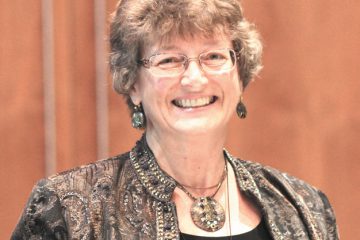Moses isn’t enough
A look at the Holy Book Series
The Jewish Family Identity Forum with Candace R. Kwiatek, The Dayton Jewish Observer

You probably think most people in Western society should be able to answer, “Who was Moses?” with at least a tale or two about this bigger-than-life biblical character. But, in the 21st century, he may be the only universally familiar Bible figure. My Sinai high school students, for example, had no idea that Solomon — a rather key biblical figure — was known for his wisdom and authored Proverbs.
Finally, recognizing the famous story of Solomon’s cleverness when faced with two mothers each claiming a child as her own, they responded, “Oh yeah, I think we learned that in fourth grade.”
Sadly, my students aren’t unique in their lack of biblical knowledge. Findings from a recently released British Bible Society survey indicate that nearly half of youths from 8 to 15 don’t know that Noah’s Ark is a biblical tale.
A third or more of the hundreds surveyed couldn’t securely identify the Bible as the source for Adam and Eve, David and Goliath, Samson and Delilah, or Jonah — and at least a quarter had never even heard these stories, or those of the Creation, Joseph, Moses, Daniel, or Solomon either. American students might fare somewhat better but I wouldn’t count on it.
Yet many adults — even the biblically illiterate — believe knowledge of the biblical stories is important, the survey notes. Public schools across America also believe it’s important; in more than 40 states, schools currently offer biblical literacy as a high school elective.
Even college professors agree almost without exception that biblical literacy is a crucial part of a good education, calling the Bible “the most influential text in all of Western culture.”
You’d think that, as the original People of the Book, we’d be doing a better job. You’d think we would want to learn what’s in the Covenant we “sign” every time we have an aliyah to the Torah.
You’d think that hearing the Torah read year after year from beginning to end would make us at least somewhat biblically literate. You’d think that the modern fads of family scrapbooking, ancestry.com, and multi-generational novels would pale next to sharing our family’s story from more than 3,000 years ago.
As central as the Bible is to the Jewish people, there are also universal reasons we become biblically literate. Here are three. The Bible is wisdom literature, offering timeless insights about nature, reality, and virtue. The Bible is a key source of Western Civilization and, more importantly, America’s founding principles. The Bible is the origin of much of our culture: language, literature, the visual arts and music.
Simply put, the Bible enriches life in a way that nothing else can.
So why aren’t we sharing the Bible with our children and grandchildren, not just in fourth grade but also from the cradle to college and beyond?
Don’t know the Bible stories? Go online and study. Or, better yet, add some of the wonderful Jewish children’s and adult books of Bible stories and commentaries to your coffee tables and bookshelves.
I have multiple bookshelves filled with great Bibles and related resources, with a whole section already started for my grandkids’ visits. And don’t let them gather dust. Be a good role model and read your own biblical literature. Read Bible stories to your children and grandchildren – on laps, on CDs, on Skype.
Find some of the Bible stories challenging or troubling, boring or debatable? So what did you expect with a name like Israel, which means to struggle with God? Explore some commentaries to see what you might be missing. Look for archaeological or historical corollaries that enliven your mental picture. Spend your time looking for truths — values, understanding, and wisdom — rather than for facts. This, too, can be great role modeling for children and a great way to engage them in the Bible.
Think youngsters won’t like Bible stories? The British survey found that at least a third of their youth participants of all ages — who knew next to nothing about the Bible — were interested in engaging more with biblical literature.
American publishers of biblical books and videos have found a profitable audience, with new titles for young children and teens appearing every year. And the Bible has some distinctly kid-friendly literary advantages:
• It’s a story about family, about real people who are fallible and lovable;
• It’s filled with action, adventure, and travel;
• It addresses real-life topics like envy, desire, retribution, and discouragement;
• It shows the nature of the world: free choice, consequences, and orderliness;
• It provides values to live by, wisdom in memorable stories or proverbs;
• Its stories often involve conflicting values, with multiple right answers;
• It has lots of “holes” that invite scholarly and personal midrash (biblical storytelling);
• It’s a series book, and kids love nothing better than…to be continued.
If our Jewish children aren’t growing up with the Bible from their youngest years, they are growing up as orphans. Links to a large part of their family history are lost: Father Abraham and joyous Miriam, forgiving Joseph and clever Esther.
As great as he was, Moses just isn’t enough. In the same way, when they aren’t learned and explored in their biblical context, rituals and holidays become quaint and puzzling practices, mitzvot (commandments) become optional good deeds, and Israel becomes just another modern upstart.
Give back to our kids and grandkids and students their inheritance: bring the Bible back into their lives.
Family Discussion: What are you going to do this year to make the Bible a bit more central in your life? How could you bring it more into the lives of your kids or grandkids or students? Start by making this year’s afikomen gift a Jewish Bible story.
Literature to share
Unscrolled, edited by Roger Bennet. You’ve heard rabbinic commentaries and sermons on the Bible, but how would an artist approach the text? What might you learn from an architect or an actor? Could a musician or screenwriter offer a new insight? This “reboot book” is a creative and engaging new look at the 54 weekly Torah readings through the eyes of leading Jewish millennials. Definitely worth exploring.
The Boy on the Wooden Box: A Memoir by Leon Leyson. Straightforward, inspirational, and deeply moving for all ages, this middle-school narrative shares the unlikely survival story of the author, one of the youngest members on Oskar Schindler’s famous list. He went on to become an American citizen, a veteran, and a teacher. A must-read.
To read the complete April 2014 Dayton Jewish Observer, click here.



